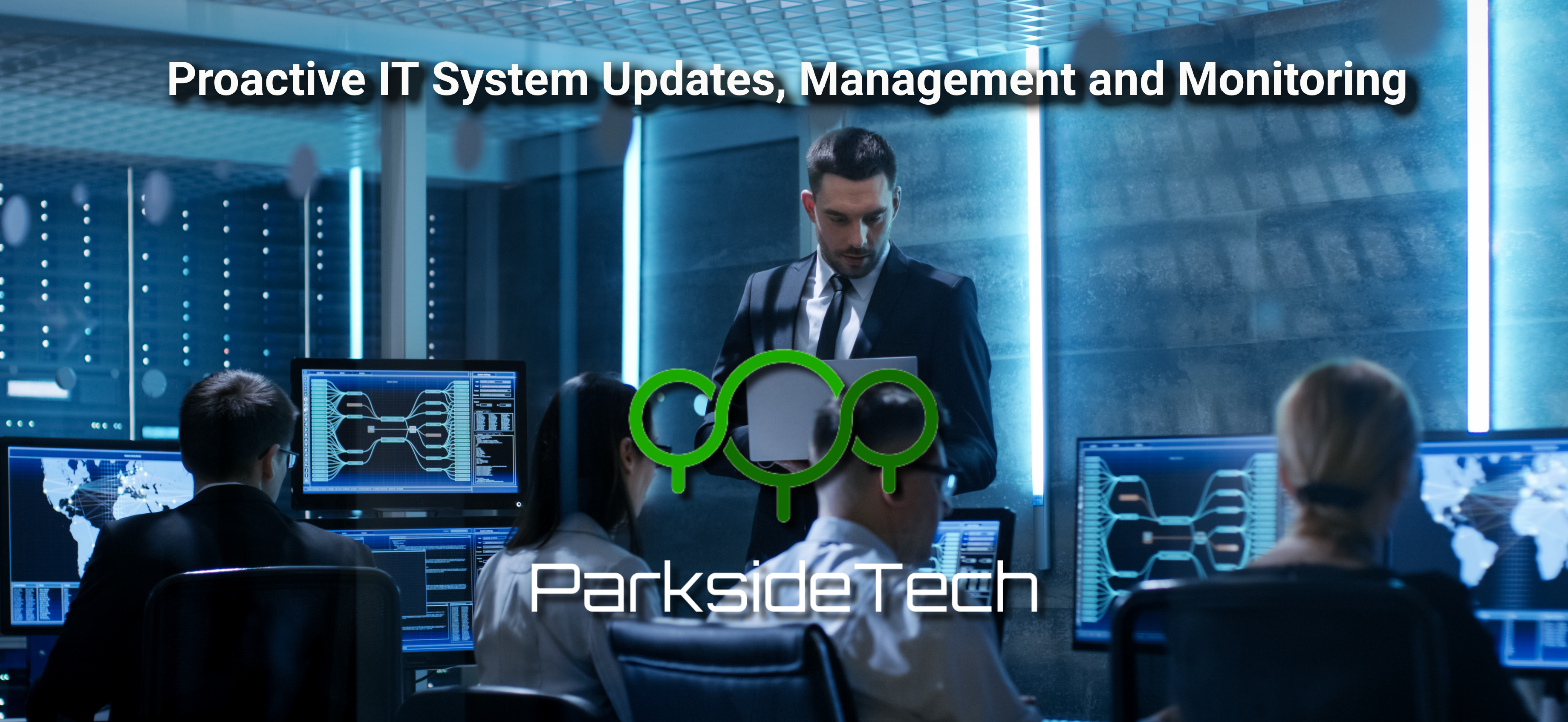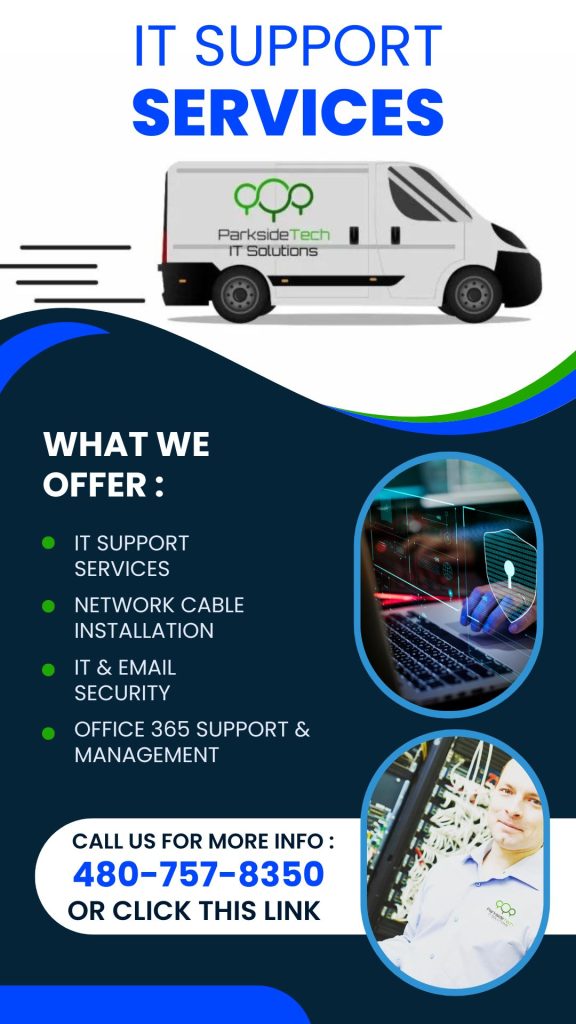In today’s competitive digital landscape, businesses of all sizes depend on effective IT infrastructure. As technology becomes increasingly complex, managing it can feel overwhelming. That’s where managed IT services come in.
At ParksideTech, based in Phoenix, we understand that reliable managed IT services are essential for streamlining operations and enhancing productivity. According to Gartner, “By 2025, 80% of organizations will shift to using managed services.” In this article, we’ll guide you in selecting the best managed IT services available to you while highlighting how ParksideTech can meet your specific needs.
By 2025, 80% of organizations will shift to using managed services

Understanding IT Services vs. Managed Services
Understanding the distinction between traditional IT services and managed services is key for businesses.
Traditional IT Services:
- Approach: Reactive support, addressing issues as they arise.
- Cost Structure: Variable costs based on incidents.
- Expertise: In-house staff or outsourced support as needed.
Managed Services:
- Approach: Proactive monitoring and maintenance to prevent issues.
- Cost Structure: Predictable monthly fees.
- Expertise: Access to a specialized team of professionals.
A TechTarget survey indicates that “62% of organizations find managed services more effective in preventing outages compared to traditional IT services.” This trend shows that businesses are increasingly opting for managed services to boost reliability and efficiency.
62% of organizations find managed services more effective in preventing outages compared to traditional IT services.
What Do Managed IT Services Companies Do?
Managed IT services companies (MSPs) like ParksideTech play a crucial role in optimizing your IT operations. We provide a range of services to ensure your technology runs smoothly, allowing you to focus on your core objectives.
Core Services Offered:
- 24/7 Monitoring: Continuous oversight of IT systems to address issues promptly.
- Cybersecurity: Advanced measures to protect against cyber threats.
- Data Backup and Recovery: Ensuring data integrity through regular backups.
- Cloud Services: Management of cloud-based solutions for remote access and collaboration.
- Help Desk Support: Quick resolution of technical issues for end-users.
The managed services market is projected to reach $354.8 billion by 2026, highlighting the growing reliance on MSPs to tackle complex IT challenges. A Forbes article states, “Companies that utilize managed services report a 30% reduction in IT costs,” emphasizing the significant value these services can provide.
Evaluating the Value of Managed Services
Are managed services worth it? The answer is a resounding yes. Here are some key benefits:
- Cost Savings:
- Predictable Expenses: Budgeting is easier with subscription models.
- Reduced Downtime: Proactive monitoring can lead to 50% less downtime, according to Aberdeen Group.
- Access to Expertise:
- Businesses gain a skilled team without the overhead of full-time hires. A CompTIA survey found that “75% of businesses using managed services reported improved IT performance.”
- Enhanced Security:
- MSPs implement robust security measures, which are critical in today’s cyber threat landscape.
- Focus on Core Business:
- Outsourcing IT management allows you to concentrate on growth and productivity.

Identifying the Need for Managed IT Services
Knowing whether your business could benefit from managed IT services is crucial. Here are some signs to consider:
- Rapid Growth: An MSP can support scaling your infrastructure efficiently.
- Limited IT Resources: For smaller businesses, MSPs offer cost-effective access to skilled professionals.
- Frequent Downtime: If outages hinder productivity, proactive support from an MSP is essential.
- Cybersecurity Concerns: Robust security measures are vital in today’s digital landscape.
- Increased IT Complexity: An MSP can simplify your IT landscape by providing integrated solutions.
According to Deloitte, “58% of organizations using managed services experienced improved operational efficiency.” If you recognize any of these signs in your business, it may be time to consider partnering with an MSP.
Cost Considerations of Managed Services
Cost is often a primary concern for businesses. Here’s how managed services can positively impact your IT budget:
- Predictable Pricing: Consistent monthly costs help avoid fluctuating expenses.
- Reduced Downtime: With downtime averaging $100,000 per hour, proactive monitoring leads to significant savings.
- Access to Advanced Technology: Leverage cutting-edge tools without hefty upfront investments.
- Efficiency Gains: Organizations using managed services see up to a 25% increase in productivity, according to Gartner.
- Avoiding Recruitment Costs: MSPs offer expertise without the costs of hiring and training.
Differentiating Managed Services from Software as a Service (SaaS)
It’s important to differentiate between managed services and SaaS. While both are cloud-based, they serve distinct functions.
Managed Services:
- Comprehensive IT management, including monitoring and support.
SaaS:
- Access to specific software applications over the internet.
According to Gartner, “By 2025, 70% of organizations will use a mix of SaaS and managed services,” showcasing the trend of leveraging both models.
Who Needs an MSP?
Many businesses can benefit from MSPs, especially in certain scenarios:
- Small to Mid-Sized Businesses
- Rapidly Growing Companies
- Organizations with Limited IT Expertise
- Industries with Compliance Requirements

Making the Right Choice: How to Select the Best Managed IT Services Near You
Finding the right managed IT services requires careful consideration:
- Define Your Needs:
Understand your specific IT requirements, including security and support. - Evaluate Experience and Expertise:
Look for a proven track record and industry experience. - Consider Local Presence:
Choose a local MSP like ParksideTech for personalized service. - Service Offerings:
Ensure the MSP provides services that match your needs. - Pricing Structure:
Review pricing models for budget alignment. - Support and Communication:
Assess the level of support and responsiveness. - Security Measures:
Evaluate security protocols to protect your business.
CompTIA reports that “74% of organizations believe partnering with an MSP is essential.” By carefully evaluating your options, you can choose an MSP that effectively supports your organization’s growth.
Conclusion
Partnering with a reliable Managed Service Provider like ParksideTech in Phoenix can optimize your IT infrastructure and enhance security. With over 60% of small businesses reporting improved operational efficiency through managed services, the right MSP can significantly impact your organization’s success.
Whether you’re a small startup or a larger company, investing in managed IT services is a strategic move that drives growth and innovation. Take the time to assess your needs and explore how ParksideTech can be your partner in achieving your business objectives.




